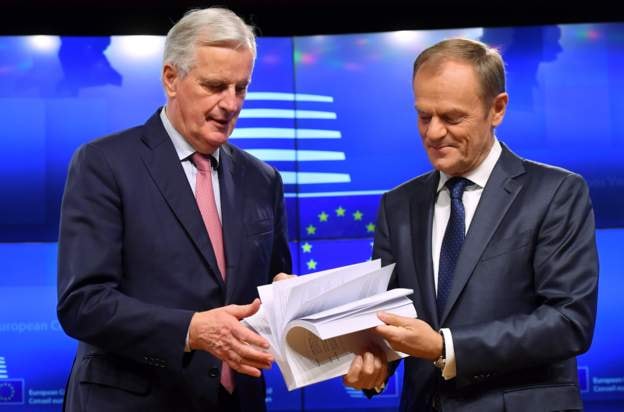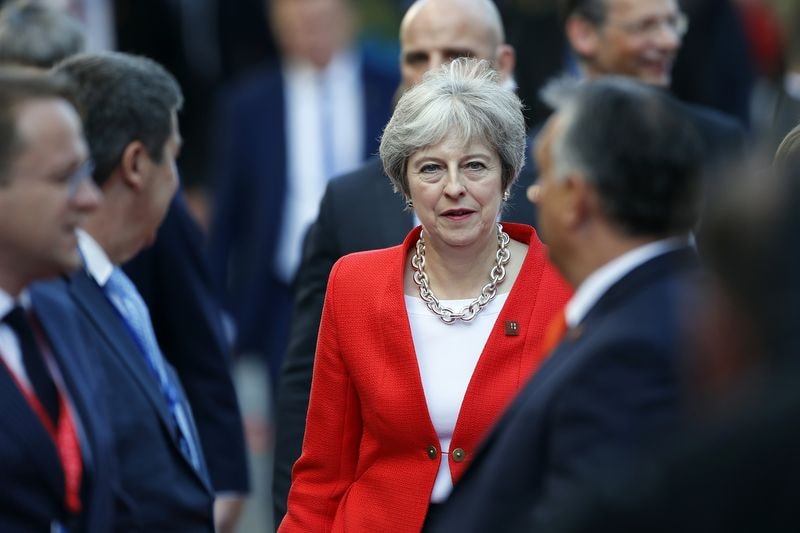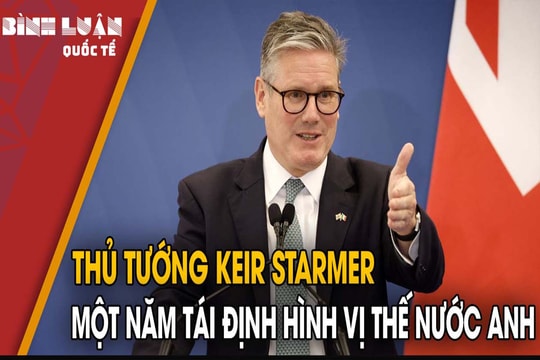Brexit negotiations: Agree on £39bn divorce bill
(Baonghean) - After 20 months of intense and exhausting negotiations, the Brexit process has just achieved an important breakthrough when the draft Brexit agreement was approved at the extraordinary EU Summit on November 25. Thus, another important barrier has been cleared. This event will mark the completion of phase 1 of the Brexit process.
EU agrees…
Since British and EU officials reached a draft Brexit agreement more than a week ago, negotiations and shuttle diplomacy have been continuously promoted to remove the final barriers, especially disagreements from some members such as Spain.
Finally, at the extraordinary EU Summit on November 25, EU leaders adopted two main Brexit documents, including a political declaration on shaping the relationship between the UK and the EU after Brexit and a 585-page EU withdrawal agreement.
 |
| EU chief Brexit negotiator Michel Barnier (left) and European Council President Donald Tusk hold the draft Brexit agreement. Photo: AFP. |
The Withdrawal Agreement is a legally binding document that sets out the terms of Britain's departure from the EU, including the £39 billion divorce bill, citizens' rights, and a contingency plan for the Irish border in case trade talks stall.
Earlier on Saturday (November 24), the final obstacles that threatened to derail this Summit were removed, notably the Gibraltar issue when the British government announced that it had reached an agreement with the Spanish government that the two sides would have direct dialogue to determine the future status of the territory of Gibraltar after the UK leaves the European Union.
According to Mr. Donald Tusk, these are the best agreements that the two sides could find after 2 years of difficult negotiations.
In fact, it is not too difficult for the draft Brexit agreement to be agreed upon by EU members because in the recent final negotiation phase, the UK has made many concessions to the EU.
For example, financially, the UK is expected to pay the EU 45 billion Euros. Or the European Court of Justice still has jurisdiction to resolve disputes related to EU citizens living in the UK.
Most importantly, the British government will have to continue to comply with European Union regulations in the areas of social, tax, environmental and state aid….
Furthermore, according to observers, although any EU member may have reasons to be unhappy about Britain's departure, overall no one wants the negotiation time to last too long.
In mid-2019, the EU will hold parliamentary elections - an important political event for the bloc. Therefore, quickly resolving the Brexit issue to focus on the issues of the upcoming election is considered a priority that Brussels officials as well as EU member states want to aim for.
Therefore, even though the negotiation process between the two sides on Brexit has encountered many difficulties, both sides are still aware that in the end, phase 1 must still be completed before March 29, 2019.
After the Brexit draft was approved at the EU Summit, the European Parliament is also expected to soon ratify this agreement and phase 2 of Brexit negotiations will officially begin on March 30, 2019 to determine the new framework for EU-UK relations.
In theory, these new negotiations should result in a new free trade agreement and a series of bilateral conventions in the fields of security or fisheries. The expected completion date for phase 2 is the end of 2020, after the UK finishes its 21-month transition period in the EU, or it could be extended until the end of 2022 as proposed by the European Commission.
Of course, to get to these planned stages, the Brexit deal needs to pass through what promises to be a difficult hurdle in the British Parliament.
Will the British Parliament accept?
As soon as the 27 EU member states issued a unified statement on the Brexit deal, a “storm” of criticism against Prime Minister Theresa May’s government broke out on British social media. Many called it a “sad day”, an “unacceptable” deal… More than 40 MPs from the ruling Conservative Party announced their readiness to vote against the draft Brexit deal.
Former British Foreign Secretary Boris Johnson, who resigned in July due to disagreements with Prime Minister Theresa May over Brexit, explained that with this agreement, Britain would remain in the customs union and in fact would also remain in the European single market.
That means Britain would effectively remain in the EU without the right to vote and make decisions on common issues.
According to him, this would make Britain a “vassal” of the bloc. Meanwhile, former Transport Minister Jo Johnson, who resigned on November 9 in protest against Mrs. May’s Brexit strategy, has called for a new referendum.
The British Parliament is expected to decide whether to approve the draft Brexit agreement that the UK and the EU have just reached in December. So in less than a month, Mrs. May will have an extremely heavy task in seeking domestic support. She is currently using a "combination of hard and soft" tactic.
On the one hand, the female Prime Minister called on the people to support this agreement “for the benefit of Britain”, while looking forward to a brighter future. She pledged to campaign with both “heart and mind” to get this Brexit agreement passed by the British Parliament.
On the other hand, Mrs. May gave a clear warning to British MPs that “either support the Brexit deal she has just reached with the EU, or there will be no Brexit at all.”
Mrs. May also warned all the rebels within the Conservative Party as well as the opposition party that if she lost her job at this time, the Brexit process would certainly be stalled and the UK would not know when it could leave the EU.
Analysts say that if the British Parliament rejects the Brexit deal, everything will return to square one and the situation will become complicated, even chaotic. Of course, with such a scenario, Prime Minister May's political fate will be more precarious than ever.
 |
| British Prime Minister Theresa May will face challenges at home. Photo: Reuters |
If she wants to get Parliament to ratify it, Mrs. May will have to make certain changes to the agreement with the EU. But this is now considered a dead end. The EU will certainly not accept any further concessions because Brexit is a “last resort”, a one-time event, not a precedent, and certainly not a future practice of the EU.
The current reality is probably something that Brexit supporters could not have imagined when they voted in the June 2016 referendum. The complexity of the negotiations, the responsibilities and obligations that bind them, make it impossible to reach a deal that satisfies all sides.
Given the current situation, the future of the UK from now until March 29, 2019 contains as many uncertainties as the ongoing Brexit negotiations. It can be said that the Brexit negotiation process is nearing its end, but it is unclear what the future will be./.




